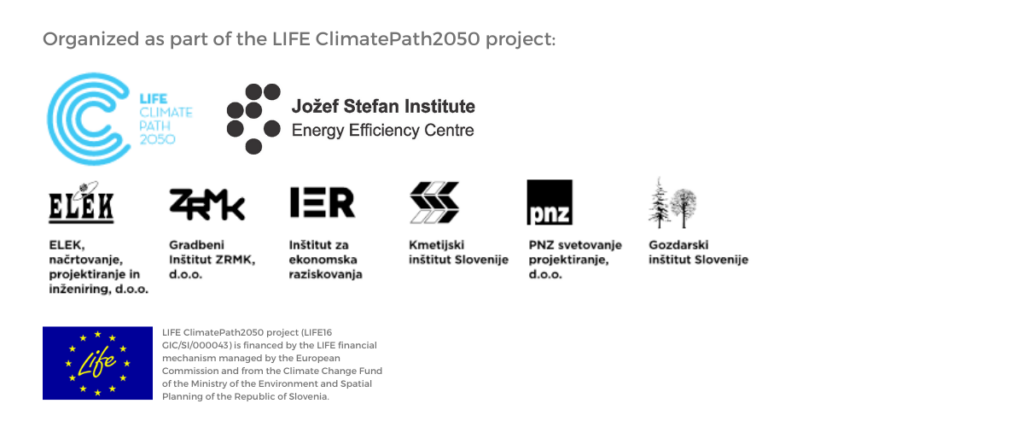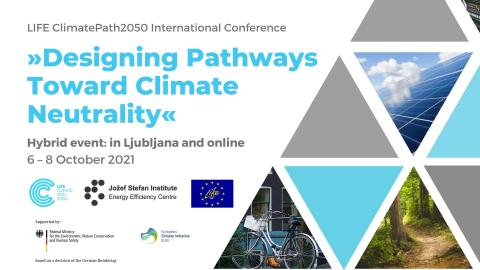Designing Pathways Toward Climate Neutrality
The Energy Efficiency Centre of the Jožef Stefan Institute, the LIFE ClimatePath2050 consortium partners announce the final conference of the project: Designing Pathways toward Carbon Neutrality, which will take place from 6 to 8 October 2021 and will be organized in a hybrid form. The conference intends to further connect the modelling community and decision-makers, including stakeholders participating in decision-making. The conference is co-organised as part of the Climate Recon 2050 project.
The first session, entitled How ambitious are the long–term climate strategies?, will be devoted to reflecting on the latest achievements and experiences. The preparation of the long-term climate strategies and national energy and climate plans are behind us. However, we are at a turning point. We need to prepare additional measures and guidelines to increase ambitions by 2030. The following topics and questions will be addressed in the session by the keynote speakers as well as in the round-table discussion.
- How important is that the long–term strategies (LTS) are participatory and inclusive?
- How are the LTS ambitious as regards the 2030 targets?
- What can we learn from each other?
- How is climate justice addressed in the climate strategies?
The second session, entitled Monitoring and evaluation for better implementation, will address a number of key issues and questions:
- Good practices in monitoring the implementation and use of monitoring results for climate governance.
- How is monitoring integrated into “plan-do-check-act” practice and what can be improved?
- Are our projections sufficiently calibrated with the monitoring results?
- The importance of monitoring the implementation of climate actions at the level of local communities and interlinkage with monitoring actions at the national level.
The third session, entitled The challenges of carbon-neutral pathway modelling and analyses in sectors energy supply and industry, will start with the introductory speakers on models for the energy supply and industry sectors and will be followed by a round addressing:
- How can new challenges be addressed through new modelling approaches and analyses?
- The integration of energy sectors requires modelling on new time and space scales – how do we cope with it? How to address key uncertainties in deriving policy recommendations?
- The implementation of policies will require social innovation – how to integrate multidisciplinary knowledge into modelling exercises?
The fourth session, entitled The challenges of modelling and analysis in the LULUCF sector, will also start with the introductory speakers and will be followed by a round table addressing:
- Experiences gained through the use of LULUCF models?
- Challenges of data collection, preparation and calibration of models?
- How can new challenges be addressed through new modelling approaches and analyses?
- How to ensure broader, better, and easier use of analysis and modelling results in policymaking?
The LIFE ClimatePath2050 conference aims to equip the participants with new knowledge that will positively contribute to the implementation of the Paris Agreement. Bold and ambitious actions need to be implemented today and every step counts. Our aim is to enable the sharing of the knowledge and experiences gained through the preparation of national strategies and background analyses among the participants, to stimulate the use thereof, and to connect the modelling community, decision-makers, and other stakeholders. That will possibly result in new projects and collaborations. We hope you will come on board and join the conference, which will inspire you.
The Organisers
The Energy Efficiency Centre of the Jožef Stefan Institute (JSI/EEC) supports national climate and energy policy stakeholders with background studies, including the following: the energy and climate plan, the long-term climate strategy, EE and RES action plans, the long-term strategy for the energy renovation of buildings, the implementation of the NEC Directive in Slovenia, etc. The JSI/EEC contributes to developing key climate, EE, and RES policy instruments and supports ministries in monitoring, evaluating, and reporting on the implementation of policies and measures. It is also strongly connected with the industry and the public sector.
The team of experts has wide insight into developments in the fields of energy efficiency (EE), analyses and strategic planning in energy, climate mitigation and air pollution reduction, renewable energy sources (RES), local energy, and energy services.
In the LIFE ClimatePath2050 project, the IJS/EEC is coordinating a consortium consisting of the following sectoral experts: ELEK, d.o.o., (the power sector), the Building and Civil Engineering Institute, ZRMK, d.o.o., Institute for Economic Research, The Agricultural Institute of Slovenia, PNZ, d.o.o., (transport), and The Slovenian Forestry Institute.


